AWM41 1072 - [Official History, 1914-18 War: Records of Arthur G Butler:] Interviews containing accounts of Nursing experiences in the AANS [Australian Army Nursing Service]. These nurses were interviewed by Matron Kellett - Part 2
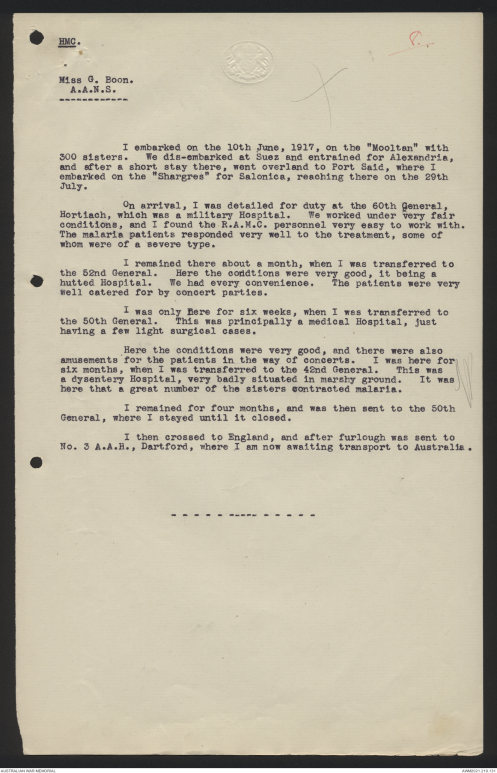
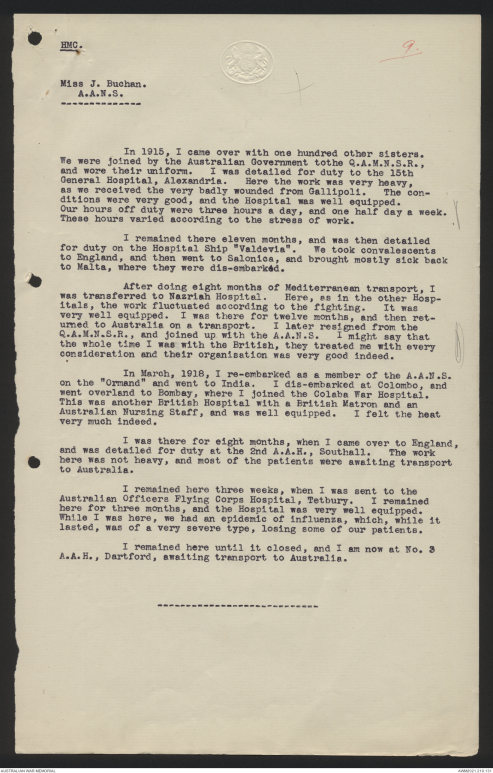
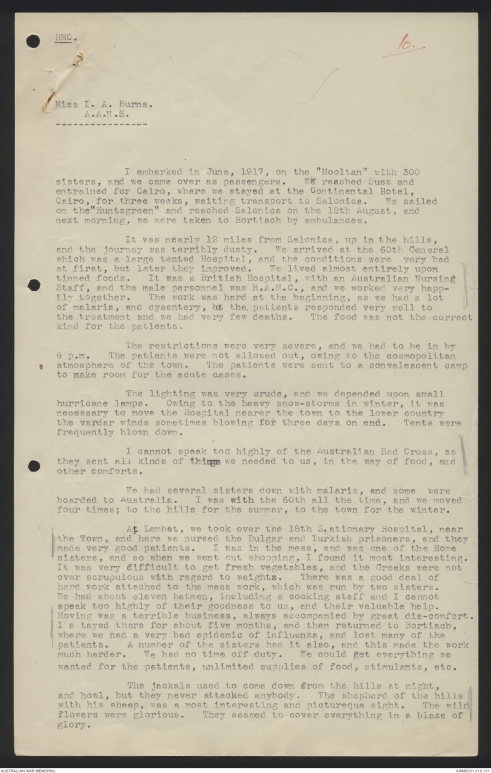
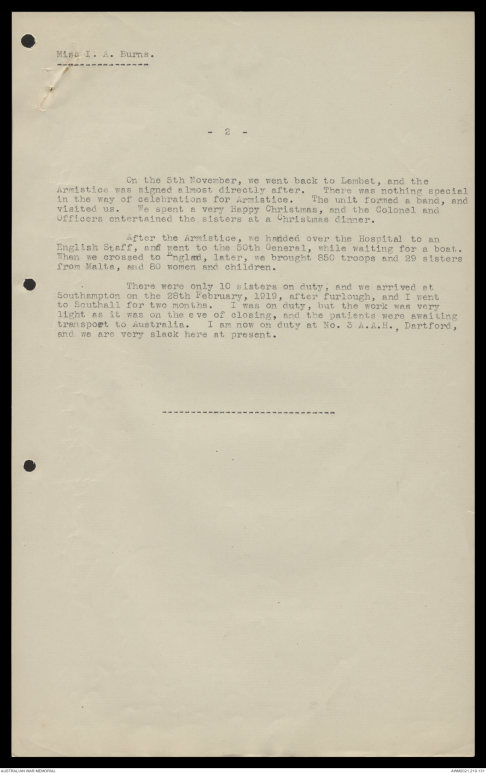
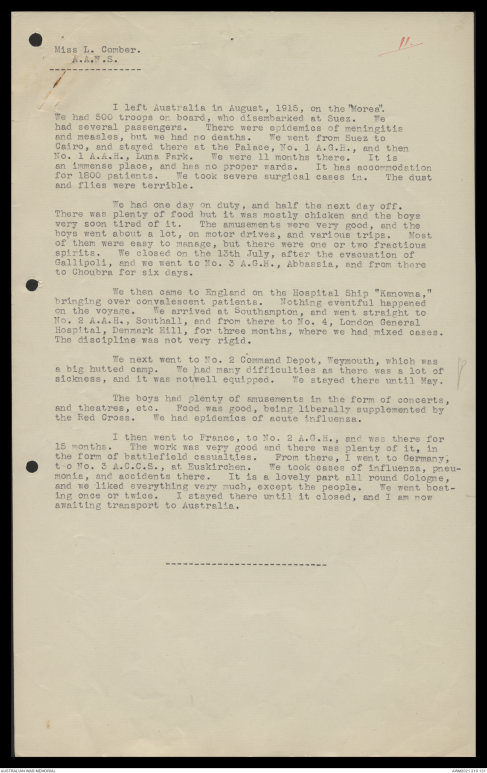
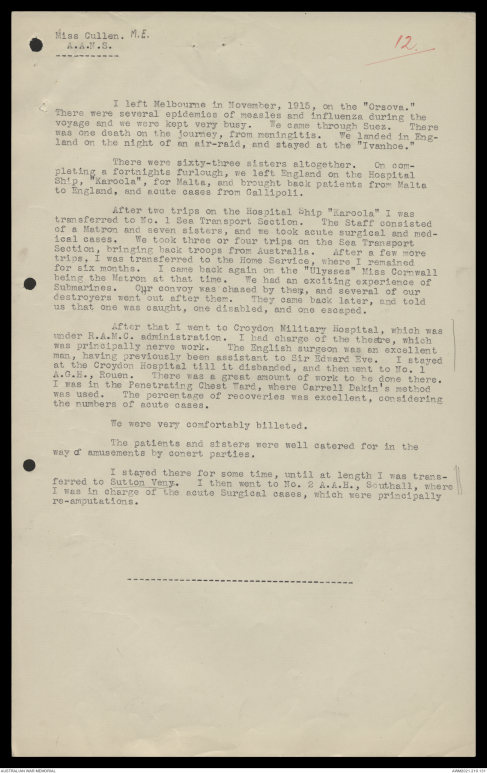
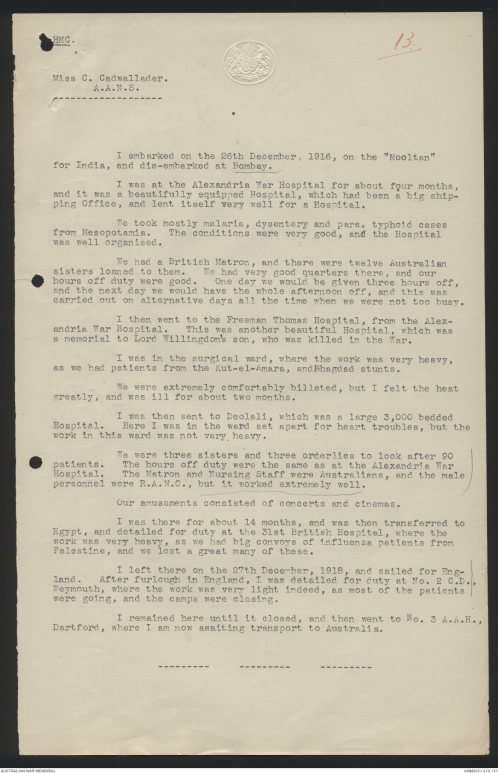
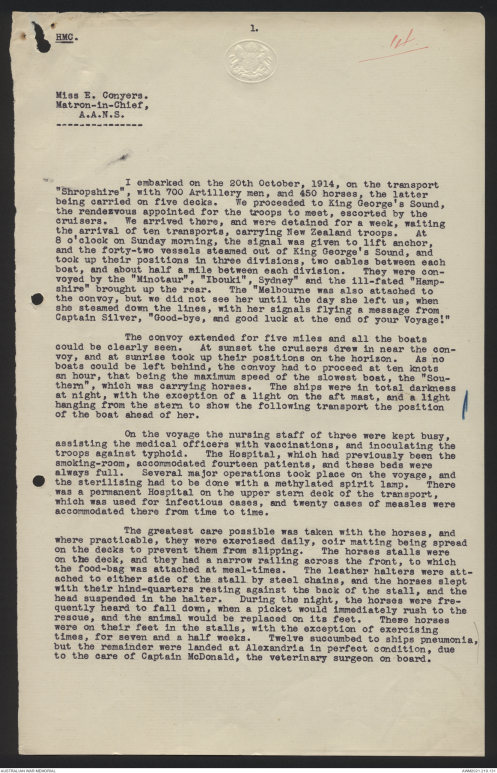
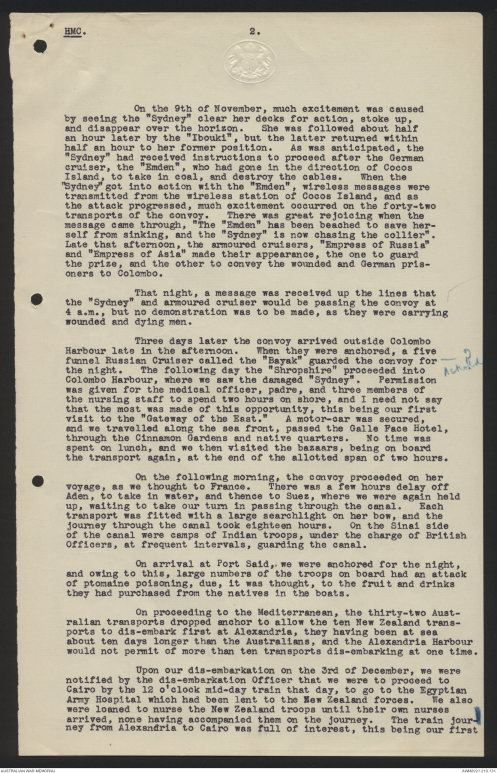
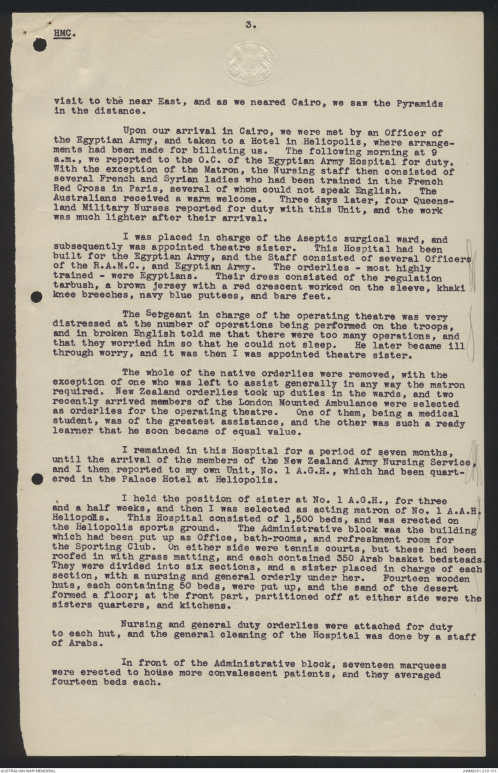
HMC.
Miss G. Boon.
A.A.N.S.
I embarked on the 10th June, 1917, on the "Mooltan" with
300 sisters. We dis-embarked at Suez and entrained for Alexandria,
and after a short stay there, went overland to Port Said, where I
embarked on the "Shargres" for Salonica, reaching there on the 29th
July.
On arrival, I was detailed for duty at the 60th General,
Hortiach, which was a military Hospital. We worked under very fair
conditions, and I found the R.A.M.C. personnel very easy to work with.
The malaria patients responded very well to the treatment, some of
whom were of a severe type.
I remained there about a month, when I was transferred to
the 52nd General. Here the conditions were very good, it being a
hutted Hospital. We had every convenience. The patients were very
well catered for by concert parties.
I was only here for six weeks, when I was transferred to
the 50th General. This was principally a medical Hospital, just
having a few light surgical cases.
Here the conditions were very good, and there were also
amusements for the patients in the way of concerts. I was here for
six months, when I transferred to the 42nd General. This was
a dysentery Hospital, very badly situated in marshy ground. It was
here that a great number of the sisters contracted malaria.
I remained for four months, and was then sent to the 50th
General, where I stayed until it closed.
I then crossed to England, and after furlough was sent to
No. 3 A.A.H., Dartford, where I am now awaiting transport to Australia.
------------------------------------------------
H.M.C.
Miss J. Buchan.
A.A.N.S.
In 1915, I came over with one hundred other sisters.
We were joined by the Australian Government to the Q.A.M.N.S.R.,
and wore their uniform. I was detailed for duty to the 15th
General Hospital, Alexandria. Here the work was very heavy,
as we received the very badly wounded from Gallipoli. The conditions
were very good, and the Hospital was well equipped.
Our hours off duty were three hours a day,and one half day a week.
These hours varied according to the stress of work.
I remained there eleven months, and was then detailed
for duty on the Hospital Ship "Valdevia". We took convalescents
to England, and then went to Salonica, and brought mostly sick back
to Malta, where they were dis-embarked.
After doing eight months of Mediterranean transport, I
was transferred to Nazriah Hospital. Here, as in the other Hospitals,
the work fluctuated according to the fighting. It was
very well equipped. I was there for twelve months, and then returned
to Australia on a transport. I later resigned from the
Q.A.M.N.S.R., and joined up with the A.A.N.S. I might say that
the whole time I was with the British, they treated me with every
consideration and their organisation was very good indeed.
In March, 1918, I re-embarked as a member of the A.A.N.S.
on the "Ormand" and went to India. I dis-embarked at Colombo, and
went overland to Bombay, where I joined the Colaba War Hospital.
This was another British Hospital with a British Matron and an
Australian Nursing Staff, and was well equipped. I felt the heat
very much indeed.
I was there for eight months, when I came over to England,
and was detailed for duty at the 2nd A.A.H., Southall. The work
here was not heavy, and most of the patients were awaiting transport
to Australia.
I remained here three weeks, when I was sent to the
Australian Officers Flying Corps Hospital, Tetbury. I remained
here for three months, and the Hospital was very well equipped.
While I was here, we had an epidemic of influenza, which while it
lasted, was of a very severe type, losing some of our patients.
I remained here until it closed, and I am now at No. 3
A.A.H., Dartford, awaiting transport to Australia.
HMC.
Miss I.A.Burns.
A.A.N.S
I embarked in June, 1917, on the "Mooltan" with 300
sisters, and we came over as passengers. We reached Suez and
entrained for Cairo, where we stayed at the Continental Hotel,
Cairo, for three weeks, waiting transport to Salonica. We sailed
on the "Huntsgreen" and reached Salonica on the 12th August, and
next morning, we were taken to Hortiach by ambulances.
It was nearly 12 miles from Salonica, up in the hills,
and the journey was terribly dusty. We arrived at the 60th General
which was a large tented Hospital, and the conditions were very bad
at first, but later they improved. We lived almost entirely upon
tinned foods. It was a British Hospital, with an Australian Nursing
Staff, and the male personnel was R.A.M.C., and we worked very happily
together. The work was hard at the beginning, as we had a lot
of malaria, and dysentery, xx the patients responded very well to
the treatment and we had very few deaths. The food was not the correct kind for the patients.
The restrictions were very sever, and we had to be in by
6 p.m. The patients were not allowed out, owing to the cosmopolitan
atmosphere of the town. The patients were sent to convalescent camp
to make room for the acute cases.
The lighting was very crude, and we depended upon small
hurricane lamps. Owing to the heavy snow-storms in winter, it was
necessary to move the Hospital nearer the town to the lower country
the vardar winds sometimes blowing for three days on end. Tents were
frequently blown down.
I cannot speak too highly of the Australian Red Cross, as
they sent all kinds of things we needed to us, in the way of food, and
other comforts.
We had several sisters down with malaria, and some were
boarded to Australia. I was with the 60th all the time, and we moved
four times; to the hills for the summer, to the town for the winter.
At Lambat, we took over the 18th Stationary Hospital, near
the Town, and here we nursed the Bulgar and Turkish prisoners, and they made very good patients. I was in the mess, and was one of the Home sisters, and so when we went out shopping, I found it most interesting. It was very difficult to get fresh vegetables, and the Greeks were not over scrupulous with regard to weights. There was good deal of hard work attached to the mess work, which was run by two sisters.
We had about eleven batmen, including a cooking staff and I cannot
speak too highly of their goodness to us, and their valuable help.
Moving was a terrible business, always accompanied by great dis-comfort. I stayed there for about five months, and then returned to Hortiach, where we had a very bad epidemic of influenza, and lost many of the patients. A number of the sisters had it also, and this made the work much harder. We had not time off duty. We could get everything we wanted for the patients, unlimited supplies of food, stimulants, etc.
The jackals used to come down from the hills at night,
and howl, but they never attacked anybody. The shepherd of the hills
with his sheep, was a most interesting and picturesque sight. The wild
flowers were glorious. They seemed to cover everything in a blaze of
glory.
Miss I. A. Burns.
-2-
On the 5th November, we went back to Lambet, and the
Armistice was signed almost directly after. There was nothing special
in the way of celebrations for Armistice. The unit formed a band, and
visited us. We spent a very Happy Christmas, and the Colonel and
Officers entertained the sisters at a Christmas dinner.
After the Armistice, we handed over the Hospital to an
English Staff, and went to the 50th General, while waiting for a boat.
Then we crossed to England, later, we brought 850 troops and 29 sisters from Malta, and 80 women and children.
There were only 10 sisters on duty, and we arrived at
Southampton on the 28th February, 1919, after furlough, and I went
to Southall for two months. I was on duty, but the work was very
light as it was on the eve of closing, and the patients were awaiting
transport to Australia. I am now on duty at No. 3 A.A.H., Dartford,
and we are very slack here at present.
Miss. L. Comber.
A.A.N.S.
I left Australia in August, 1915,on the "Morea".
We had 500 troops on board, who disembarked at Suez. We
had several passengers. There were epidemics of meningitis
and measles, but we had no deaths. We went from Suez to
Cairo, and stayed there at the Palace, No. 1 A.G.H., and then
No. 1 A.A.H., Luna Park. We were 11 months there. It is
an immense place, and has no proper wards. It has accommodation
for 1800 patients. We took severe surgical cases in. The dust
and flies were terrible.
We had one day on duty,and half the next day off.
There was plenty of food but it was mostly chicken and the boys
very soon tired of it. The amusements were very good, and the
boys went about a lot, on motor drives, and various trips. Most
of them were easy to manage, but there were one or two fractious
spirits. We closed on the 13th July, after the evacuation of
Gallipoli, and we went to No. 3 A.G.H., Abbassia, and from there
to Choubra for six days.
We then came to England on the Hospital Ship "Kanowna",
bringing over convalescent patients. Nothing eventful happened
on the voyage. We arrived at Southampton, and went straight to
No. 2 A.A.H., Southall, and from there to No. 4, London General
Hospital, Denmark Hill, for three months, where we had mixed cases.
The discipline was not very rigid.
We next went to No. 2 Command Depot, Weymouth, which was
a big hutted camp. We had many difficulties as there was a lot of
sickness, and it was not well equipped. We stayed there until May.
The boys had plenty of amusements in the form of concerts,
and theatres, etc. Food was good, being liberally supplemented by
the Red Cross. We had epidemics of acute influenza.
I then went to France, to No. 2 A.G.H., and was there for
15 months. The work was very good and there was plenty of it, in
the form of battlefield casualties. From there, I went to Germany,
to No. 3 A.C.C.S., at Euskirchen. We took cases of influenza, pneumonia, and accidents there. It is a lovely part all round Cologne,
and we liked everything very much, except the people. We went boating once or twice. I stayed there until it closed, and I am now
awaiting transport to Australia.
Miss Cullen. M.E.
A.A.N.S.
I left Melbourne in November, 1915, on the "Orsova".
There were several epidemics of measles and influenza during the
voyage ad we were kept very busy. We came through Suez. There
was one death on the journey, from meningitis. We landed in England
on the night of an air-raid, and stayed at the "Ivanhoe".
There were sixty-three sisters altogether. On completing
a fortnights furlough, we left England on the Hospital
Ship, "Karoola", for Malta, and brought back patients from Malta
to England, and acute cases from Gallipoli.
After two trips on the Hospital Ship "Karoola" I was
transferred to No. 1 Sea Transport Section. The Staff consisted
of a Matron and seven sisters, and we took acute surgical and medical
cases. We took three or four trips on the Sea Transport
Section, bringing back troops from Australia. After a few more
trips, I was transferred to the Home Service, where I remained
for six months. I came back again on the "Ulysses" Miss Cornwall
being the Matron at that time. We had an exciting experience of
Submarines. Our convoy was chased by them,and several of our
destroyers went out after them. They came back later, and told
us that one was caught, one disabled, and one escaped.
After that I went to Croydon Military Hospital, which was
under R.A.M.C. administration. I had charge of the theatre, which
was principally nerve work. The English surgeon was an excellent
man, having previously been assistant to Sir Edward Eve. I stayed
at the Croydon Hospital till it disbanded, and then went to No. 1
A.G.H., Rouen. There was a great amount of work to be done there.
I was in the Penetrating Chest Ward, where Carrell Dakin's method
was used. The percentage of recoveries was excellent, considering
the numbers of acute cases.
We were very comfortably billeted.
The patients and sisters were well catered for in the
way of amusements by concert parties.
I stayed there for some time, until at length I was transferred
to Sutton Veny. I then went to No. 2 A.A.H., Southall, where
I was in charge of the acute Surgical cases, which were principally
re-amputations.
HMC.
Miss C. Cadwallader.
A.A.N.S.
I embarked on the 26th December, 1916, on the "Mooltan"
for India, and dis-embarked at Bombay.
I was at the Alexandria War Hospital for about four months,
and it was a beautifully equipped Hospital, which had been a big shipping Office, and lent itself very well for a Hospital.
We took mostly malaria, dysentery, and para, typhoid cases
from Mesopotamia. The conditions were very good, and the Hospital
was well organised.
We had a British Matron, and there were twelve Australian
sisters loaned to them. We had very good quarters there, and our
hours off duty were good. One day we would be given three hours off,
and the next day we would have the whole afternoon off, and this was
carried out on alternative days all the time when we were not too busy.
I then went to the Freeman Thomas Hospital, from the Alexandria
War Hospital. This was another beautiful Hospital, which was
a memorial to Lord Willingdon's son, who was killed the Tar.
I was in the surgical ward, where the work was very heavy,
as we had patients from the Kut-el-Amara,and Bhagdad stunts.
We were extremely comfotably billeted, but I felt the heat
greatly, and was ill for about two months.
I was then sent to Deolali, which was a large 3,000 bedded
Hospital. Here I was in the ward set apart for heart troubles, but the
work in this ward was not very heavy.
We were three sisters and three orderlies to look after 90 patients.
The hours off duty were the same as at the Alexandria War
Hospital. The Matron and Nursing Staff were Australians, and the male
personnel were R.A.M.C., but it worked extremely well.
Our amusements consisted of concerts and cinemas.
I was there for about 14 months, and was then transferred to
Egypt, and detailed for duty at the 31st British Hospital, where the
work was very heavy, as we had big convoys of influenza patients from
Palestine, and we lost a great many of these.
I left there on the 27th December, 1918, and sailed for England.
After furlough in England, I was detailed for duty at No. 2 C.D., Weymouth, where the work was very light indeed, as most of the patients were going, and the camps were closing.
I remained here until it closed, and then went to No. 3 A.A.H.,
Dartford, where I am now awaiting transport to Australia.
1.
HMC.
Miss E.Conyers.
Matron-in-Chief,
A.A.N.S.
I embarked on the 20th October, 1914, on the transport
"Shropshire", with 700 Artillery men, and 450 horses, the latter
being carried on five decks. We proceeded to King George's Sound,
the rendezvous appointed for the troops to meet, escorted by the
cruisers. We arrived there, and were detained for a week, waiting
the arrival of ten transports, carrying New Zealand troops. At
8 o'clock on Sunday morning, the signal was given to lift anchor,
and the forty-two vessels steamed out of King George's Sound, and
took up their positions in three divisions, two cables between each
boat, and about half a mile between each division. They were convoyed
by the "Minotaur", "Ibouki", Sydney" and the ill-fated "Hampshire"
brought up the rear. The "Melbourne" was also attached to
the convoy, but we did not see her until the day she left us, when
she steamed down the lines, with here signals flying a message from
Captain Silver, "Good-bye, and good luck at the end of your Voyage!".
The convoy extended for five miles and all the boats
could be clearly seen. At sunset the cruisers drew in near the convoy,
and at sunrise took up their positions on the horizon. As no
boats could be left behind, the convoy had to proceed at ten knots
an hour, that being the maximum speed of the slowest boat, the "Southern", which was carrying horses. The ships were in total darkness
at night, with the exception of a light on the aft mast, and a light
on the boat ahead of her.
On the voyage the nursing staff of three were kept busy,
assisting the medical officers with vaccinations, and inoculating the
troops against typhoid. The Hospital, which had previously been the
smoking-room, accommodated fourteen patients, and these beds were
always full. Several major operations took place on the voyage, and
the sterilising had to be done with methylated spirit lamp. There
was a permanent Hospital on the upper stern deck of the transport,
which was used for infectious cases, and twenty cases of measles were
accommodated there from time to time.
The greatest care possible was taken with the horses, and
where practicable, they were exercised daily, coir matting being spread
on the decks to prevent them from slipping. The horses stalls were
on the deck, and they had a narrow railing across the front, to which
the food-bag was attached at meal-times. The leather halters were attached to either side of the stall by steel chains, and the horses slept
with their hindquarters resting against the back of the stall, and the
head suspended in the halter. During the night, the horses were frequently heard to fall down, when a picket would immediately rush to the rescue, and the animal would be replaced on its feet. These horses
were on their feet in the stalls, with the exception of exercising
times, for seven and a half weeks. Twelve succumbed to ships pneumonia, but the remainder were landed at Alexandria in perfect
condition, due to the care of Captain McDonald , the veterinary surgeon on board.
HMC. 2.
On the 9th of November, much excitement was caused
by seeing the "Sydney" clear her decks for action, stoke up,
and disappear over the horizon. She was followed about half
an hour later by the "Ibouki", but the latter returned within
half an hour to her former position. As was anticipated, the
"Sydney" had received instructions to proceed after the German
cruiser, the "Emden", who had gone in the direction of Cocos
Island, to take in coal, and destroy the cables. When the
"Sydney" got into action with the "Emden", wireless messages were
transmitted from the wireless station of Cocos Island, and as
the attack progressed, much excitement occurred on the forty-two
transports of the convoy. There was great rejoicing when the
message came through, "The Emden" has been beached to save herself from sinking, and the "Sydney" is now chasing the collier".
Late that afternoon, the armoured cruisers, "Empress of Russia"
and "Empress of Asia" made their appearance, the one to guard
the prize, and the other to convey the wounded and German prisoners
to Colombo.
That night, a message was received up the lines that
the "Sydney" and armoured cruiser would be passing the convoy at
4 a.m., but no demonstration was to be made, as they were carrying
wounded and dying men.
Three days later the convoy arrived outside Colombo
Harbour late in the afternoon. When they were anchored, a five
funnel Russian Cruiser called the "Bayak" guarded the convoy for
the night. The following day the "Shropshire" proceeded into
Colombo Harbour, where we saw the damaged "Sydney". Permission
was given for the medical officer, padre, and three members of
the nursing staff to spend two hours on shore, and I need not say
that the most was made of this opportunity, this being our first
visit to the "Gateway of the East". A motor-car was secured,
and we travelled along the sea front, passed the Galle Face Hotel,
through the Cinnamon Gardens and native quarters. No time was
spent on lunch, and we then visited the bazaars, being on
the transport again, at the end of the allotted span of two hours.
On the following morning, the convoy proceeded on her
voyage, as we thought to France. There was a few hours delay off
Aden, to take in water, and thence to Suez, where we were again held
up, waiting to take our turn in passing through the canal. Each
transport was fitted with a large searchlight on her bow, and the
journey through the canal took eighteen hours. On the Sinai side
of the canal were camps of Indian troops, under the charge of British
Officers, at frequent intervals, guarding the canal.
On arrival at Port Said, we were anchored for the night,
and owing to this, large numbers of the troops on board had an attack
of ptomaine poisoning, due , it was thought, to the fruit and drinks
they had purchased from the natives in the boats.
On proceeding to the Mediterranean, the thirty-two Australian
transports dropped anchor to allow the ten New Zealand transports
to dis-embark first at Alexandria, they having been at sea
about ten days longer than the Australians, and the Alexandria Harbour
would not permit of more than ten transports dis-embarking at one time.
Upon our dis-embarkation on the 3rd of December, we were
notified by the dis-embarkation Officer that we were to proceed to
Cairo by the 12 o'clock mid-day train that day, to go to the Egyptian
Army Hospital which had been lent to the New Zealand forces. We also
were loaned to nurse the New Zealand troops until their own nurses
arrived, none having accompanied them on the journey. The train journey from Alexandria to Cairo was full of interest, this being our first
HMC. 3.
visit to the near East, and as we neared Cairo, we saw the Pyramids
in the distance.
Upon our arrival in Cairo, we were met by an Officer of
the Egyptian Army, and taken to a Hotel in Heliopolis, where arrangements had been made for billeting us. The following morning at 9 a.m., we reported to the O.C. of the Egyptian Army Hospital for duty.
With the exception of the Matron, the Nursing staff then consisted of
several French and Syrian ladies who had been trained in the French
Red Cross in Paris, several of who could not speak English. The
Australians received a warm welcome. Three days later, four Queensland Military Nurses reported for duty with this Unit, and the work was much lighter after their arrival.
I was placed in charge of the Aseptic surgical ward, and
subsequently was appointed theatre sister. This Hospital had been
built for the Egyptian Army,and the Staff consisted of several Officers
of the R.A.M.C., and the Egyptian Army. The orderlies - most highly
trained -were Egyptians. Their dress consisted of the regulation
tarbush, a brown jersey with a red crescent worked on the sleeve, khaki
knee breeches, navy blue puttees, and bare feet.
The Sergeant in charge of the operating theatre was very
distressed at the number of operations being performed on the troops,
and in broken English told me that there were too many operations, and that they worried him so that he could not sleep. He later became ill through worry, and it was then I was appointed theatre sister.
The whole of the native orderlies were removed, with the
exception of one who was left to assist generally in any way the matron
required. New Zealand orderlies took up duties in the wards, and two
recently arrived members of the London Mounted Ambulance were selected as orderlies for the operating theatre. One of them, being a medical student, was of the greatest assistance, and the other was such a ready learner that he soon became of equal value.
I remained in this Hospital for a period of seven months,
until the arrival of the members of the New Zealand Army Nursing Service, and I then reported to my own Unit, No. 1 A.G.H., which had been quartered in the Palace Hotel at Heliopolis
I held the position of sister a No. 1 A.G.H., for three
and a half weeks and then I was selected as acting matron of No. 1 A.A.H. Heliopolis. This Hospital consisted of 1,500 beds, and was erected on the Heliopolis sports ground. The Administrative block was the building which had been put up as Office, bath-rooms, and refreshment room for the Sporting Club. On either side were tennis courts, but these had been roofed in with grass matting, and each contained 350 Arab basket bedsteads. They were divided into six sections, and a sister placed in charge of each section, with a nursing and general orderly under her. Fourteen wooden huts, each containing 50 beds, were put up, and the sand of the desert formed a floor; at the front part, partitioned off at either side were the sisters quarters, and kitchens.
Nursing and general duty orderlies were attached for duty
to each hut, and the general cleaning of the Hospital was done by a staff
of Arabs.
In front of the Administrative block, seventeen marquees
were erected to house more convalescent patients, and they averaged
fourteen beds each.
 Sam scott
Sam scottThis transcription item is now locked to you for editing. To release the lock either Save your changes or Cancel.
This lock will be automatically released after 60 minutes of inactivity.